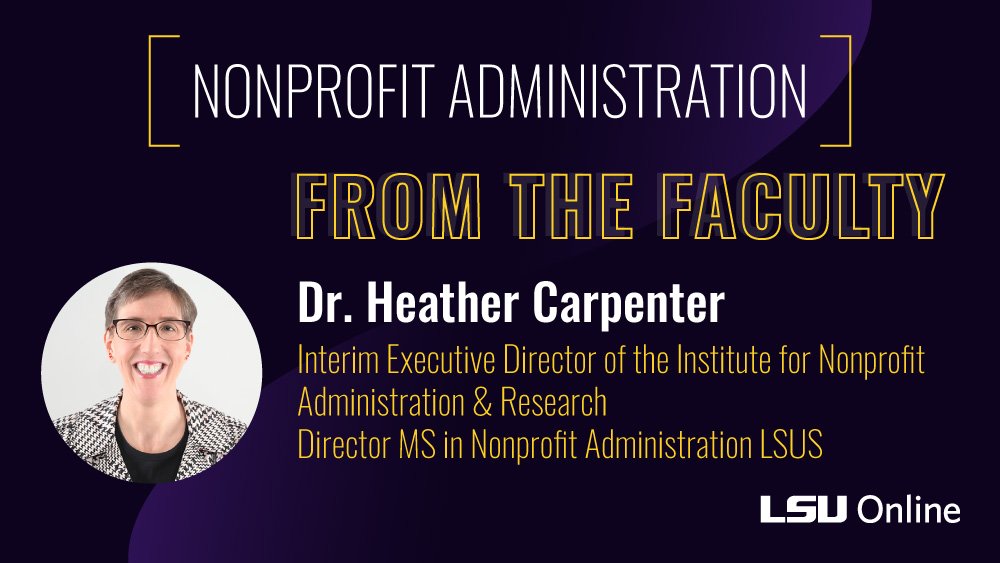To those interested in a nonprofit career, the field can seem large and complex without the right tools to navigate it. Choosing the best degree program for you can seem even more confusing. We want to help make it simpler for you by providing a guide to finding the best graduate program for a nonprofit career. Read on to learn more!
Types of Nonprofit Master’s Degrees
There are many different types of graduate degree programs that can be considered "nonprofit-focused" or "nonprofit education." Some of these degrees include:
- Master's of Nonprofit Administration
- Master's of Business Administration
- Master's of Public Administration
- Master's of Social Work
- Master's of Public Policy
Best Graduate Degrees for Your Nonprofit Career
If your nonprofit career goals include becoming an Executive Director, starting your own nonprofit, or working in development, finance, or administration, a stand-alone Master's of Nonprofit Administration (aka MNO/MNS/MNM/MS in NP) may be for you. Master's degree programs like this one offer core and elective courses in managing a nonprofit organization.
Courses in this program include some of the following:
- Nonprofit Management
- Board Governance
- Fundraising
- Nonprofit Finance and Accounting
- Nonprofit Law
- Capital Campaign and Development
- Nonprofit Human Resources
Such programs are often members of the Nonprofit Academic Centers Council. For example, LSU Shreveport's Master of Science in Nonprofit Administration program is accredited by the Nonprofit Academic Centers Council.
Are you interested in working for the government and studying the intersection between government and nonprofits? Consider pursuing a Master's of Public Administration (a.k.a MPA, MPSA, MPIA). These master's degree programs offer core courses in managing a governmental organization and offer elective courses in managing a nonprofit organization.
If you want to run a business or study social entrepreneurship, you should consider pursuing a Master's of Business Administration. These master's degree programs offer core courses in managing a business.
Working directly with clients and constituents daily or managing the programmatic side of nonprofit organizations, would likely require pursuing a Master's of Social Work. This master's degree program offers core courses in social welfare and social change and elective courses in managing a nonprofit organization.
If you are interested in changing social policy related to nonprofit organizations, you should consider pursuing a Master's of Public Policy (a.k.a. MA in PP, MPPA). These master's degree programs offer core courses in creating and changing public policy and offer elective courses in managing a nonprofit organization.
Please note, the descriptions above are generalizations. You should always visit a master's degree program website to see the specific courses offered within the program.
A Note About Stand-Alone Nonprofit Master’s Degree Programs
When looking for the best nonprofit master's degree in the country, you will not find it listed on the U.S. News and World Report website. They rank graduate schools -- not master's degree programs. The site also ranks top public affairs schools with nonprofit specializations and top business schools with nonprofit specializations. Still, these rankings completely ignore stand-alone nonprofit master's degree programs like the one offered at LSU Shreveport.
Start Your Journey with LSU Shreveport
When you are ready to start or advance your career in the nonprofit field, LSU Shreveport, in partnership with LSU Online, is here for you. We offer the solid support you need to help you become successful in this field. Our courses are affordable and as easy to access as possible. Our nonprofit programs are flexible and 100% online, and we offer flat-rate tuition to students nationwide.
Ready to get started advancing your nonprofit career? Take the first step! Browse our online courses, or get in touch with an Enrollment Coach today!
Learn more about the Online Master of Science in Nonprofit Administration
Nonprofit Administration Program